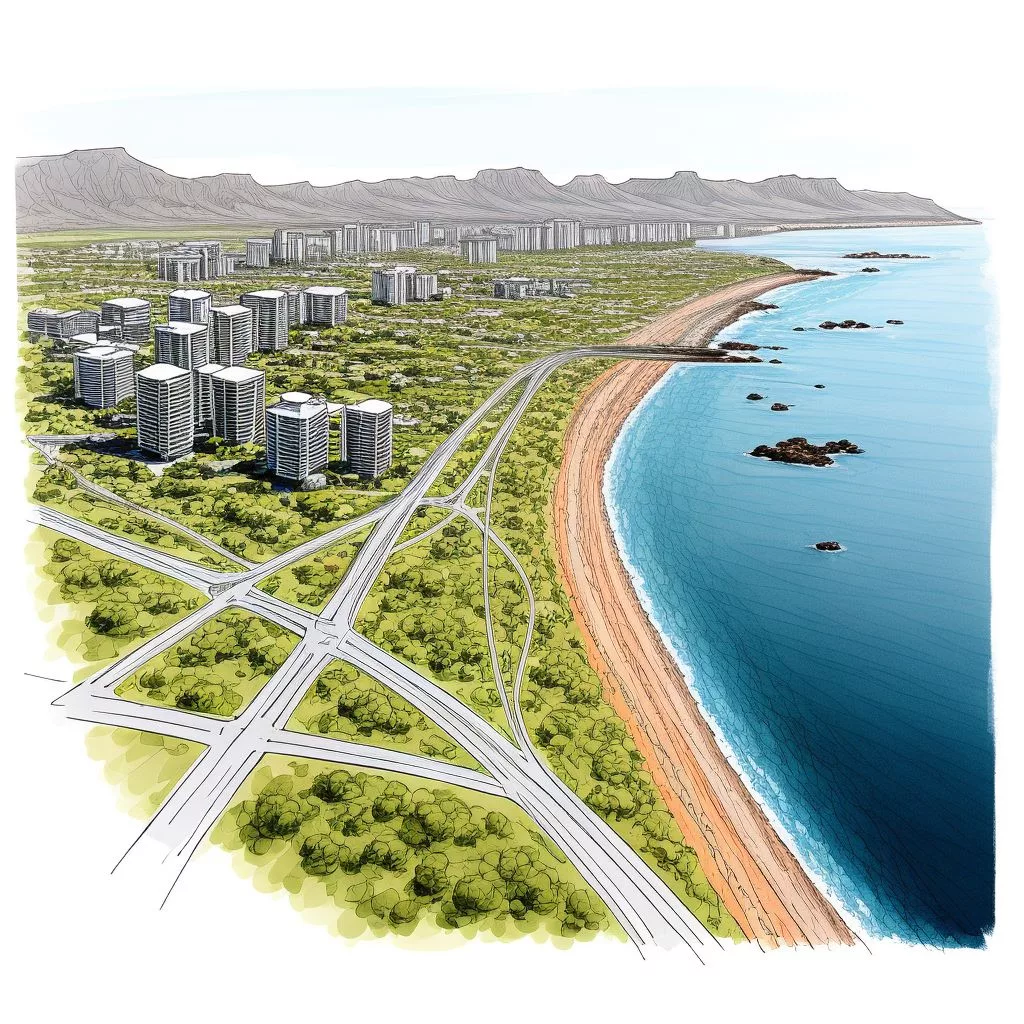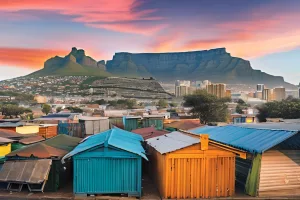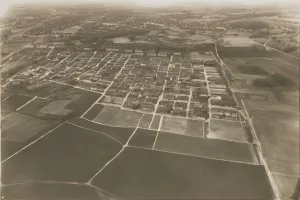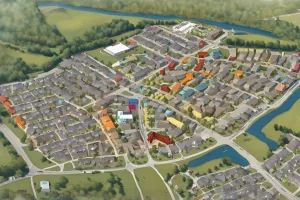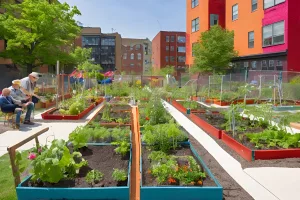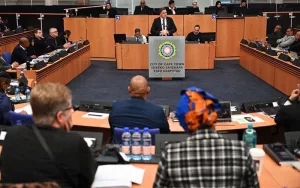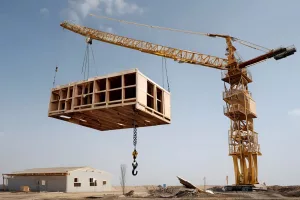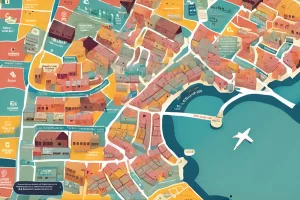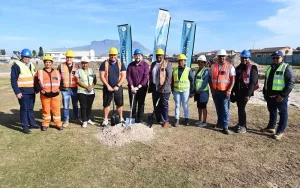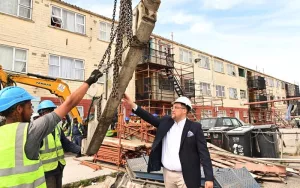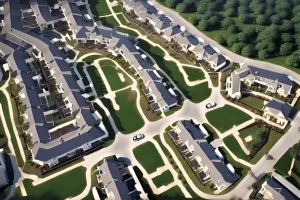Cape Town is planning to transform Erf 2187 in Green Point into a vibrant neighborhood with homes, shops, parks, and easy public transport. The city wants the area to be affordable and welcoming for people from all backgrounds, mixing new buildings with historic charm. Residents are invited to share their ideas to help shape this exciting project. With strong bus links and green spaces, Erf 2187 aims to become a lively, connected place where everyone can live, work, and play. This redevelopment is a big step toward a greener, fairer, and more inclusive Cape Town.
Cape Town is facing a big challenge with affordable housing as more people move into the city, known for its stunning views and lively culture. Mayor Geordin HillLewis is leading efforts to increase the national housing budget and build 12,000 rental units to help solve this problem. He believes that giving more money to housing projects and protecting funding for lowincome communities is vital to provide homes for everyone. By working together with the government and local communities, Cape Town hopes to create a fairer and more welcoming city for all its residents.
Navigating Cape Town’s Housing Challenges: A Closer Look at the Backyarder Programme
The Backyarder Programme in Cape Town is a bright effort to help people living in tough conditions in the city’s backyards. It provides basic needs like water, electricity, and sanitation for those who often get overlooked. While Cape Town shines with beauty and culture, many residents face real struggles in informal settlements. The program aims to lift their living standards, but it also highlights the challenges of helping those on private land. With strong community voices pushing for change, Cape Town dreams of a fairer future where everyone can access the services they deserve.
In the lively KwaZuluNatal region of South Africa, the Portfolio Committee on Human Settlements is on a mission to improve housing for everyone. With a visit planned for October 2024, they will check how well housing policies are working and listen to communities affected by issues like flooding. Led by Chairperson Nocks Seabi, the committee believes that everyone deserves a safe home, emphasizing the importance of fair housing and helping people own their properties. By connecting with community voices and addressing challenges, they aim to bring hope and dignity to all residents, making sure that everyone has a place to call home.
Cape Town is on an exciting journey to create more affordable homes for its people. The city plans to build over 680 social housing units in Lansdowne and Ottery, aiming to provide safe and decent living spaces for families. With the support of the Mayor, this project promises to bring hope and community spirit, making sure everyone has a place to call home. Through public involvement and smart planning, Cape Town is shaping a brighter, more inclusive future for its residents.
The City of Cape Town has an exciting plan to turn the old Woodstock Hospital site into a lively area with around 10,000 affordable rental homes. This project will not only help people find good places to live but also boost the local economy and celebrate the neighborhood’s rich culture. Despite facing challenges, like illegal occupations of the site, the City is committed to listening to everyone’s needs and making this vision a reality. By blending housing with art and community spirit, Woodstock is set to become a thriving, inclusive place for all.
Cissie Gool House is a shining symbol of hope in Cape Town’s fight for affordable housing. In 2017, brave activists transformed an old, neglected hospital into a home for 900 people, creating a vibrant community that stands against unfair housing practices. Their struggle has sparked important conversations with city leaders, who are now exploring ways to build more homes while ensuring current residents are not pushed out. This story shows the power of people coming together, fighting for their rights, and dreaming of a better future where everyone can have a place to call home.
Cape Town is taking action to address the need for affordable rental housing by revising the Municipal Planning Bylaw to attract micro and smallscale developers to invest in areas where housing is urgently needed. The proposed changes aim to establish and manage these developments, leading to higher quality, safer housing units that are legally connected to essential services. By introducing spatial policies and strategies, the city plans to construct safer, better quality homes in informal settlements and backyards, aligning with Objective 8 of the City’s Integrated Development Plan.
Langa’s apartheidera zones are a stark reminder of the poverty that still reverberates from that time. The derelict hostels that function as homes for residents, spanning generations, entrap them in a cycle of destitution. The need for a transition towards a more balanced society is amplified by the glaring reality of the poverty that surrounds them. Despite promises of redevelopment plans, the residents continue to wait for a better future, their hope resilient amidst the ruins of the past.
Cape Town’s Mayor Geordin HillLewis presented a comprehensive advocacy agenda focused on law enforcement, passenger rail services, affordable housing, and economic development, reflecting the city’s commitment to improving the lives of its residents. Specific proposals include municipal police investigative authority, a transfer of responsibility for train services to the city, and the release of national megaproperties for affordable residential units. HillLewis’s agenda is a canvas of positivity, potential, and wellplanned development, reflecting the city’s commitment to embracing change and innovation.
The South African government is committed to providing housing for its citizens and has allocated a substantial part of its budget to upgrading informal settlements and providing access to basic amenities. Despite fiscal issues and budget reductions, the government is focusing on social and affordable housing and launched initiatives to empower vulnerable groups and small businesses. The government is also aiming to create spatially integrated human settlements, improve disaster and emergency housing, and expedite the issuance of title deeds to deserving beneficiaries.
The Annandale affordable housing project in Dunoon, promised by Cape Town’s mayor in 2018, has yet to be completed. The absence of new housing has led to overcrowding and the formation of informal settlements in the area. The municipal planning application for rezoning the land for housing was only submitted in 2022, and an environmental assessment is currently underway. Construction is planned for the next fiscal year, and eligible applicants can update their information on the Housing Needs Register. Despite the promising plan, the community still struggles with overpopulation and housing shortages.
The City of Cape Town is making strides towards providing affordable housing for its residents through a strategic decision to allocate land for the development of 375 units, retail space, and over 300 gap and market rental units in the New Market Street site in Woodstock. This initiative reflects a shift in the City’s approach to housing development, as it embraces involving the private sector in the provision of affordable housing. The location of the development, within easy reach of amenities and public transport, is set to dramatically alter the lives of its future residents.
Cape Town is ushering in a new era of affordable housing with the Bonteheuwel Infill housing project, which will provide 273 modern housing units by the end of 2025. The project is a symbol of the city’s dedication to providing dignity and human settlements for its citizens, with a fair and transparent allocation process. This architectural marvel embodies the Breaking New Ground statesubsidised houses and is a beacon of hope for future housing schemes, driving Cape Town closer to its objective of becoming a city for all.
Cape Town is investing over R4 billion in a plan to improve housing and essential services for its inhabitants. The Building for Jobs Budget 2024/25 includes over R3 billion for informal settlements, focusing on services such as electricity, water and sanitation, and waste management, while more than R1 billion has been dedicated to formal and affordable housing. The city is also seeking partnerships to unlock more land parcels for human settlements and is committed to ensuring every Cape Town inhabitant has a decent place to call home.
The South African government has made significant progress in providing affordable housing and community infrastructure, despite challenges such as the lingering effects of apartheidera spatial planning and corruption. Initiatives such as upgrading informal settlements and eliminating asbestos roofing have had a positive impact, and the commitment to inclusion of designated groups, such as women, is inspiring. The government remains resolute in reforming apartheidera regulations and prioritizing vulnerable communities in its service delivery programs. Challenges remain, but progress has been made, and the commitment to uplifting the lives of the most vulnerable communities is evident.

